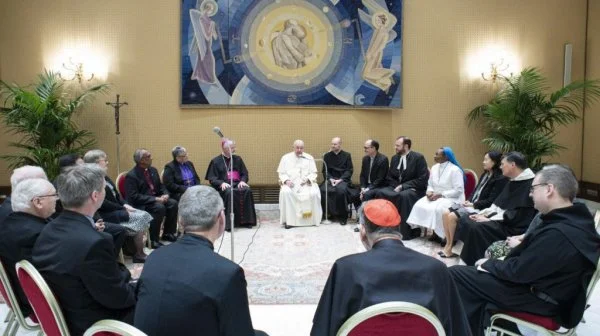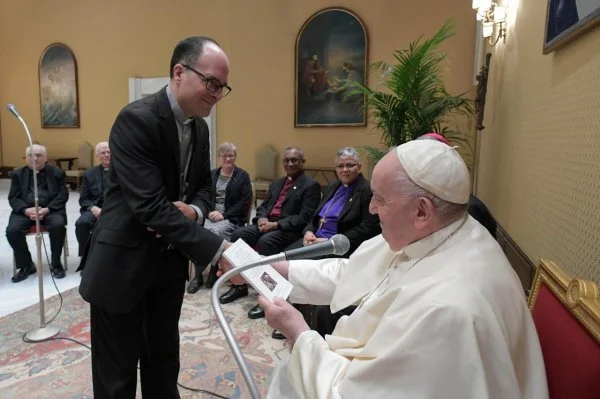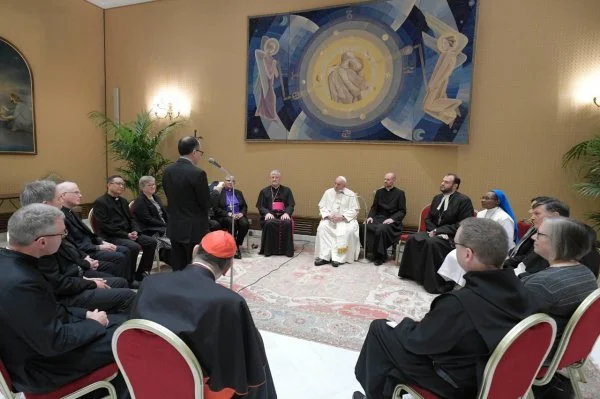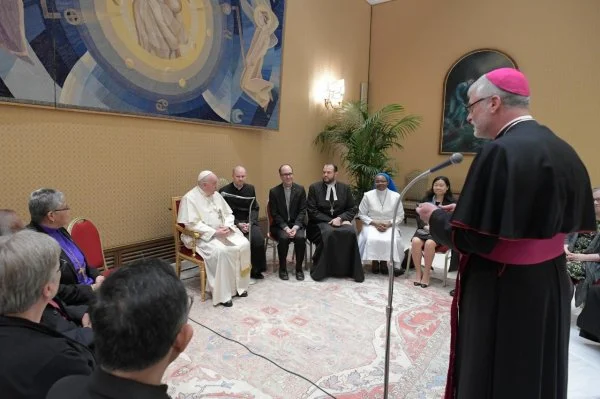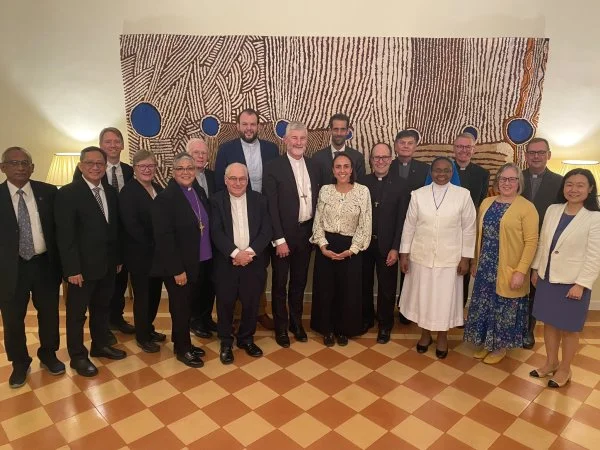- Français
- |
- Booklist
- |
- Week of Prayer
- |
- Links
- Areopagus - a forum for dialogue
- Academic journals
- Acronyms
- Bible tools
- Bibliographies
- Booksellers and publishers
- Churches
- Canadian church headquarters
- Directory of Saskatchewan churches
- Retreat centres
- Saskatchewan church and non-profit agencies
- Ecumenism.net Denominational links
- Anabaptist & Mennonite
- Anglican
- Baptist
- Evangelical
- Independent episcopal
- Lutheran
- Methodist, Wesleyan, and Holiness
- Miscellaneous
- Mormon
- Orthodox (Eastern & Oriental)
- Para-church ministries
- Pentecostal / charismatic
- Presbyterian & Reformed
- Quaker (Society of Friends)
- Roman & Eastern Catholic
- United and uniting
- Documents of Ecumenical Interest
- Ecumenical agencies
- Ecumenical Booklist
- Ecumenical Dialogues
- Glossary
- Human rights
- Inter-religious links
- Justice & peace
- Lectionaries
- Religious news services
- Resource pages
- Search Ecumenism.Net
- |
- Documents
- Ancient & Medieval texts
- Ecumenical Dialogues
- Interreligious
- Anabaptist & Mennonite
- Anglican
- Evangelical
- Lutheran
- Orthodox
- Reformed & Presbyterian
- Roman & Eastern Catholic
- United & Uniting
- Miscellaneous churches
- Canadian Council of Churches (CCC)
- Conference of European Churches (CEC)
- Interchurch Families International Network (IFIN)
- National Council of Churches in Australia (NCCA)
- Lausanne Committee for World Evangelism (LCWE)
- World Council of Churches (WCC)
- Other ecumenical documents
Church traditions
Documents from ecumenical agencies
- |
- Dialogues
- Adventist-Reformed
- African Instituted Churches-Reformed
- Anglican-Lutheran
- Anglican-Orthodox
- Anglican-Reformed
- Anglican-Roman Catholic
- Anglican-United/Uniting
- Baptist-Reformed
- Disciples of Christ-Reformed
- Disciples of Christ-Roman Catholic
- Evangelical-Roman Catholic
- Lutheran-Mennonite
- Lutheran-Mennonite-Roman Catholic
- Lutheran-Reformed
- Lutheran-Roman Catholic
- Mennonite-Reformed
- Mennonite-Roman Catholic
- Methodist-Reformed
- Methodist-Roman Catholic
- Oriental Orthodox-Reformed
- Orthodox-Reformed
- Orthodox-Roman Catholic
- Pentecostal-Reformed
- Prague Consultations
- REC-WARC Consultations
- Roman Catholic-Lutheran-Reformed
- Roman Catholic-Reformed
- Roman Catholic-United Church of Canada
- |
- Quick links
- Canadian Centre for Ecumenism
- Canadian Council of Churches
- Ecumenical Shared Ministries
- Ecumenism in Canada
- Interchurch Families International Network
- International Anglican-Roman Catholic Commission for Unity and Mission
- Kairos: Canadian Ecumenical Justice Initiatives
- North American Academy of Ecumenists
- Prairie Centre for Ecumenism
- Réseau œcuménique justice et paix
- Week of Prayer for Christian Unity
- Women's Interchurch Council of Canada
- World Council of Churches
- |
- Archives
- |
- About us
Methodists and Anglicans walking together with the Catholic Church in 2023
— Feb. 29, 202429 févr. 2024Original English text. A translation was published in the Italian edition of L’Osservatore Romano, 23 January 2024.
Like many ecumenical partners, Methodists and Anglicans walked very closely with the Catholic Church throughout many significant events in 2023. This common journeying has taken various forms, including sympathy and prayerful solidarity on the occasion of the funeral of Pope Benedict XVI at the very beginning of the year, to participation in the Ordinary General Assembly of the Synod of Bishops in the later part of the year, with many other events and encounters in between.
Listening
As part of the preparation for the Synod, Anglicans and Methodists from several countries took part in a symposium entitled Listening to the West at the Angelicum University, from 26 to 28 January. The symposium was an exercise in what is sometimes called ‘receptive learning’ – an opportunity for Catholics to listen to and learn from other traditions. In this case, the ‘listening’ was focused on the other churches’ experience of synodality. As the Catholic Church seeks to rediscover and deepen its synodal character, the symposium aimed to provide an opportunity for Catholics to learn from the synodal practices and experiences of our dialogue partners.
Participants found that the practice of receptive learning is not always easy. It can be easier to notice and react to differences or perceived incongruities than to listen and learn. The Methodist and Anglican traditions worldwide are also much less homogenous than the Catholic Church. For instance, some Methodist churches have bishops, but some do not. Many Anglican churches have women at all levels of ministry and governance, but some do not. Despite these differences, there was indeed real learning for Catholics as the Church prepared for the Ordinary General Assembly of the Synod. Themes such as the centrality of Baptism, the shared responsibility of all for the life of the Church and the need for structures of mutual accountability, were particularly notable.
Responding to what he listened to at the end of the three days, the veteran French theologian Hervé Legrand OP said: “Half a century ago a meeting like this would have been unthinkable either in Rome or in this university. To our guests: You have just participated in a first. We wanted to listen to you and you have graciously come to help us. For an older theologian, this is a great joy to see. We owe it to the Second Vatican Council, a council which the Holy Spirit clearly visited.”
Visits
A very concrete example of Christians of different traditions walking together was the Ecumenical Peace Pilgrimage to South Sudan from 3 to 5 February, undertaken jointly by the Archbishop of Canterbury, Most Reverend Justin Welby, the Moderator of the General Assembly of the Church of Scotland, Right Reverend Iain Greenshields, and Pope Francis with a desire to strengthen the will for peace in that war-torn country. This was the first time ever that a Bishop of Rome made such a joint visit with other western church leaders. As well as engagements with their respective church communities, the three leaders participated in several joint events during the pilgrimage, including an Ecumenical Prayer for Peace. At his first General Audience after the pilgrimage, Pope Francis reflected on the ecumenical significance of the visit, saying that “we went together to bear witness that it is possible, and a duty, to collaborate in diversity, especially if one shares faith in Jesus Christ”.
The Ecumenical Peace Pilgrimage to South Sudan was not the only encounter between the Pope and the Archbishop of Canterbury in 2023. Archbishop Welby visited Rome again at the end of September. As well as participating in the ‘Together’ Ecumenical Prayer Vigil in St Peter’s Square on 30 September, in preparation for the General Assembly of the Synod, the Archbishop had a private meeting with the Holy Father and attended the Consistory for the creation of new cardinals that morning. A further practical example of Anglicans and Catholics walking together was the presence not only of Archbishop Welby but of three other Anglican Primates at the Consistory. Archbishop Hosam Naoum of Jerusalem, Archbishop Thabo Makgoba of Capetown and Archbishop Justin Badi of Juba were present too, in fraternal support of the new cardinals from the Holy Land, South Africa and South Sudan. The Archbishop of York, Most Reverend Stephen Cottrell, the second most senior bishop in the Church of England, also visited Rome during the year. He was received in private audience by Pope Francis on 22 May. Like Archbishop Welby, he returned to Rome for the ‘Together’ vigil on 30 September.
Synods
Both the World Methodist Council and the Anglican Communion were invited to nominate ‘fraternal delegates’ to take part in the Ordinary General Assembly of the Synod of Bishops in October. In an indication of the seriousness with which the Synod is viewed by many of our ecumenical partners, the most senior figure in international Methodism, Reverend Dr Jong Chun Park from South Korea, President of the World Methodist Council, was the Methodist delegate. The Anglican Communion was represented by Bishop Martin Warner of Chichester, England.
Catholics are also often welcomed to the assemblies of our ecumenical partners. Following on from the presence of a delegation from the Catholic Church at the 2022 Lambeth Conference, the Dicastery for Promoting Christian Unity was represented at the Anglican Consultative Council meeting in Accra, Ghana, in February 2023. It is expected that the Dicastery will also be represented at the meeting of the World Methodist Council in Gothenburg, Sweden, in August 2024.
Dialogue
Alongside the many visits and other encounters between church leaders, the formal work of engaging in Catholic-Methodist and Catholic-Anglican theological dialogue is entrusted to two commissions, the Methodist-Roman Catholic International Commission (MERCIC) and the Anglican-Roman Catholic International Commission (ARCIC), respectively.
A plenary meeting of the third phase of ARCIC took place from 7 to15 May in Larnaca, Cyprus. The commission is currently working on the second part of the mandate entrusted to ARCIC III by the late Pope Benedict XVI and Archbishop Rowan Williams, examining how the Church local, regional and global discerns right ethical teaching. It is envisaged that this work will result in the publication of an Agreed Statement, to complement the document published by the Commission in 2017, Walking Together on the Way: Learning to be the Church. Local, Regional and Universal. The next plenary meeting of the commission will take place in Strasbourg, France, in May 2024.
The 2023 plenary meeting of the twelfth phase of MERCIC was due to take place at the Tantur Institute, Jerusalem, from 30 October to 3 November. Sadly, the current war in Israel and Palestine made that impossible and the meeting took place instead in hybrid format in Rome and online. On the first day of the meeting, the members who were present in Rome celebrated an Ecumenical Liturgy of Repentance and Reconciliation, led by the commission co-chairs, Reverend Prof. Edgardo Colón-Emeric, Dean of Duke Divinity School, USA, and Most Reverend Shane Mackinlay, Bishop of Sandhurst, Australia. The service had been published by MERCIC in God in Christ Reconciling: On the Way to Full Communion in Faith, Sacraments, and Mission, in May 2022, as a resource for Catholics and Methodists in their pursuit of reconciliation and unity.
The current round of MERCIC’s dialogue is focused broadly on the theme of unity and mission. With the 1700 year anniversary of the Council of Nicaea approaching in 2025, the commission resolved to publish an updated version of Together To Holiness, a synthesis document of the commission’s work from 1967-2006, adding further material from the commission’s three reports published since then. The hope is that this revised synthesis document will re-demonstrate the unity already shared by Methodists and Catholics through their common Baptism and shared Christian faith. The next plenary meeting of MERCIC is scheduled for 21-29 September 2024 in Seoul, South Korea.
Bishops, Unity and Mission
Alongside ARCIC, the Catholic Church has a second official commission with the Anglican Communion, the International Anglican-Roman Catholic Commission for Unity and Mission (IARCCUM). It has complementary aims, including translating the degree of unity that has been already discovered into visible and practical outcomes, promoting and monitoring the formal response and reception of the agreed statements of ARCIC, and encouraging Anglican and Catholic bishops to develop projects and programmes of joint witness and mission in the world.
In order to promote such joint episcopal witness and mission, IARCCUM is holding its second summit meeting for bishops from 22 to 29 January 2024. A unique feature of IARCCUM is that the bishops come in pairs, Catholic and Anglican, from each country represented. They come as pilgrim pairs of bishops, to reflect and pray together, to share with and learn from their fellow bishops from other regions about the contexts in which they serve. Over fifty bishops are participating in the 2024 summit, coming from 27 countries.
The first part of the summit will take place in Rome from 22 to 26 January. On their final morning in Rome, the bishops will visit and pray in the church of San Gregorio al Celio, from where Pope Gregory the Great sent Augustine, the first Archbishop of Canterbury, to preach the Gospel in England. Like St Augustine, after leaving the church, they will set off for England and the second part of the summit will then take place in Canterbury, from 26 to 29 January. Among the themes for the summit are synodality in the Anglican and Catholic traditions, how the work of ARCIC might be better ‘received’, and the nature of authority in service of the Gospel. Authority in the church has been explored by ARCIC several times in terms of teaching and decision-making, but during this meeting, the bishops will be called to reflect too on how authority is exercised in the church.
As well as their discussions, and presentations from invited speakers, while in Rome, the bishops will visit the tombs of the Apostles Peter and Paul and Bartholomew. The will participate in the Anglican office of Choral Evensong in St Peter’s Basilica and the Roman office of Vespers at St Paul’s Basilica. At the Basilica of San Bartolomeo all’Isola, ‘Sanctuary of the New Martyrs’, including several from the Anglican traditions, there will be an Anglican celebration of the Eucharist, at which the Archbishop of Canterbury, Most Reverend Justin Welby, will preside and preach. That evening, as the Week of Prayer for Christian Unity concludes, Pope Francis will preside at the customary Vespers for the feast of the Conversion of St Paul. As always, numerous Christian leaders will accompany the Pope for the liturgy, including on this occasion, Archbishop Welby. At the end of the service, the Bishop of Rome and the Archbishop of Canterbury will commission the pairs of IARCCUM bishops to go forth, walking together, and ministering alongside one another, so as to be “a foretaste of the reconciling of all Christians in the unity of the one and only Church of Christ”.
The Reverend Fr Martin Browne OSB is the official for Methodist and Anglican relations at the Vatican’s ecumenical department (Dicastery for Promoting Christian Unity).

 Permanent link: ecumenism.net/?p=14080
Permanent link: ecumenism.net/?p=14080
Categories: News • In this article: Anglican, Martin Browne, Methodist

 Lien permanente : ecumenism.net/?p=14080
Lien permanente : ecumenism.net/?p=14080
Catégorie : News • Dans cet article : Anglican, Martin Browne, Methodist



